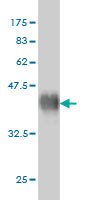ST1680 Sigma-AldrichAnti-FGFR2 Mouse mAb (1G3)
Anti-FGFR2, mouse monoclonal, clone 1G3, recognizes the FDFR2 in human stomach carcinoma tissue. It is validated for use in ELISA, Western blotting, and immunohistochemistry (paraffin sections).
More>> Anti-FGFR2, mouse monoclonal, clone 1G3, recognizes the FDFR2 in human stomach carcinoma tissue. It is validated for use in ELISA, Western blotting, and immunohistochemistry (paraffin sections). Less<<Synonyms: Anti-Fibroblast Growth Factor Receptor 2
Recommended Products
Áttekintés
| Replacement Information |
|---|
Kulcsspecifikációk táblázata
| Species Reactivity | Host | Antibody Type |
|---|---|---|
| H | M | Monoclonal Antibody |
Products
| Katalógusszám | Csomagolás | Menny./csomag | |
|---|---|---|---|
| ST1680-100UG | 100 μg |
| Description | |
|---|---|
| Overview | Recognizes the FDFR2 protein in human stomach carcinoma tissue. |
| Catalogue Number | ST1680 |
| Brand Family | Calbiochem® |
| Synonyms | Anti-Fibroblast Growth Factor Receptor 2 |
| References |
|---|
| Product Information | |
|---|---|
| Form | liquid |
| Formulation | In PBS, pH 7.2. |
| Positive control | Human stomach carcinoma tissue |
| Preservative | None |
| Quality Level | MQ100 |
| Physicochemical Information |
|---|
| Dimensions |
|---|
| Materials Information |
|---|
| Toxicological Information |
|---|
| Safety Information according to GHS |
|---|
| Safety Information |
|---|
| Product Usage Statements |
|---|
| Packaging Information |
|---|
| Transport Information |
|---|
| Supplemental Information |
|---|
| Specifications |
|---|
| Global Trade Item Number | |
|---|---|
| Katalógusszám | GTIN |
| ST1680-100UG | 04055977223873 |
Documentation
Anti-FGFR2 Mouse mAb (1G3) MSDS
| Title |
|---|







